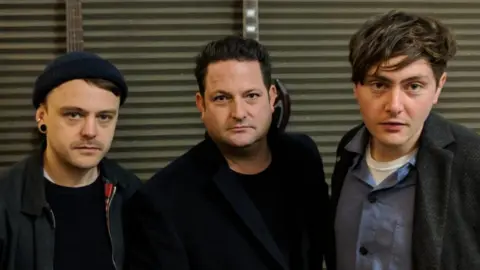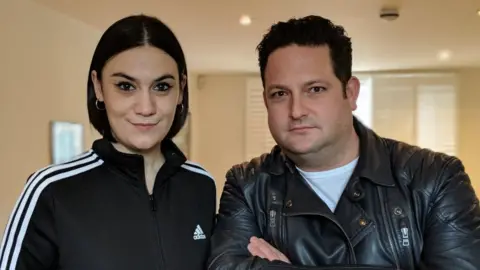Meet the bands who are making politics personal
As the lead singer in a punk band, there's something a bit different about Joe Talbot.
It's not the word "pops" tattooed on his neck (a tribute to his dad, who hates neck tattoos). It's not the staring intensity when he takes the stage with his band, Idles.
What's different about him is that, while earning rave reviews and selling out punk gigs, Joe's also a registered support worker for adults with learning difficulties.
The juxtaposition between Joe's work and his artistic life is one of the things explored in my new documentary, The Art of Now: Band Politics for BBC Radio 4.
From spirituals and the blues through to Bob Dylan, Public Enemy and grime; music and political protest have always been inseparable - but I wanted to investigate what I consider to be one of the most exciting waves of political songwriting we've seen in years.
To explore what was so distinctive about the artists I'm playing on BBC 6 Music, I spent time at gigs and rehearsals with Nadine Shah, Life and Cabbage, asking what motivated them - and trying to find out what made their political song writing so utterly contemporary.
And while I won't give away the conclusion here, one aspect is that shifts in the business model of the music industry are changing the way some musicians have to compartmentalise their work and creativity.

Mez from the band Life can grip an audience with his suave, angular stage presence but, when I meet him, he too is juggling a day job. He's a busy, focused youth project worker, patiently dealing with endless queries at The Warren in Hull, a centre for under-25s which incorporates a counselling service and a food bank.
The work informs the songs he co-writes, such as In Your Hands, which detail the challenge of shopping for a bargain when you're on a budget.
That ongoing, frontline experience is in stark contrast to the previous generation's concept of rock meeting politics - which might be summed up as Noel Gallagher on the steps of Number 10.
The generation before that will remember Sting or Bono elevated on a stage, highlighting human rights abuses but - especially when it comes to an artist's capacity to earn in the music industry - those are bygone eras.
Like Mez, the Manchester indie band Cabbage bring direct insight to their music - in that, when they write about rail privatisation, they do so from the perspective of a group who are rely on public transport. No chauffeurs for them.
Nadine Shah, who sings about being a second generation Muslim immigrant, is also a world away from what might be called "political grandstanding". I begin the documentary with her insights, as she brings a focused, journalistic dedication to portraying first-person perspectives on the migrant crisis on her third album, Holiday Destination.
"Fatalities in the water," she sings on the title track. "Traffic jam by your side.
"Feed your son / Feed your daughter / How you gonna sleep tonight?"
Allow Google YouTube content?
Back with Joe Talbot, the lead singer of Idles tells me that caring for his mother, who suffered a stroke when he was 16, didn't just set him on the course of a future job in care - it fuelled his songwriting.
He said: "I'm not going to lie to anyone. I'm not going to pretend that I'm OK with where the NHS is, or where the government is, so why lie?
"I don't want to sing about puppies and rainbows, about going out and having a good time. I want to sing about what affects me and what affects the livelihood and the safety of the people I care about."
Joe acknowledges that success in the band means he will work less - as the people he supports deserve 100% of his attention, and nothing less.

Despite their first-hand insights, each of these acts have to confront a specific problem: You can make political statements all you like - but is there any point if your audience all agree with you?
The demographics of alternative music mean there aren't many commercially-successful guitar acts singing about the triumph of capitalism and the benefits of targeted private investment in the NHS.
The reasons why contemporary musicians generally lean to the left are addressed in the documentary by the arts journalist Bernadette McNulty.
"An important element to youth protest music is that they need a target," she says. "You need to feel angry.
"Being in opposition, trying to ferment revolution… doing it for the people, those kind of ideas are a natural fit with this kind of spiky, immediate guitar music."
I was shocked to hear that, shortly after our conversation, Bernadette died in tragic circumstances. Her family wanted her contribution to remain - and I was personally grateful for her brilliant insights into a partnership which re-establishes itself with every generation - politics and music.
Band Politics will be broadcast on BBC Radio 4 at 11:30 on Thursday, 22 March.

Follow us on Facebook, on Twitter @BBCNewsEnts, or on Instagram at bbcnewsents. If you have a story suggestion email [email protected].

